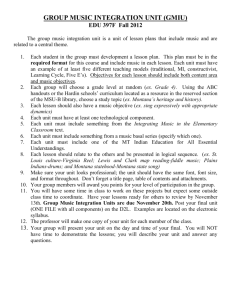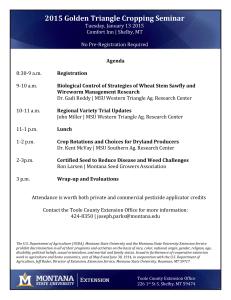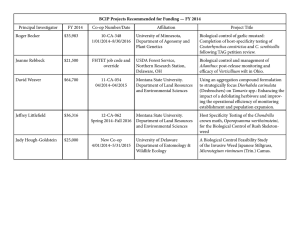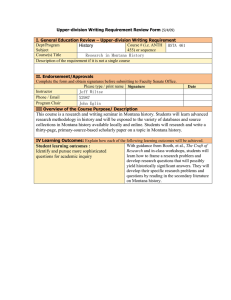Course Form
advertisement
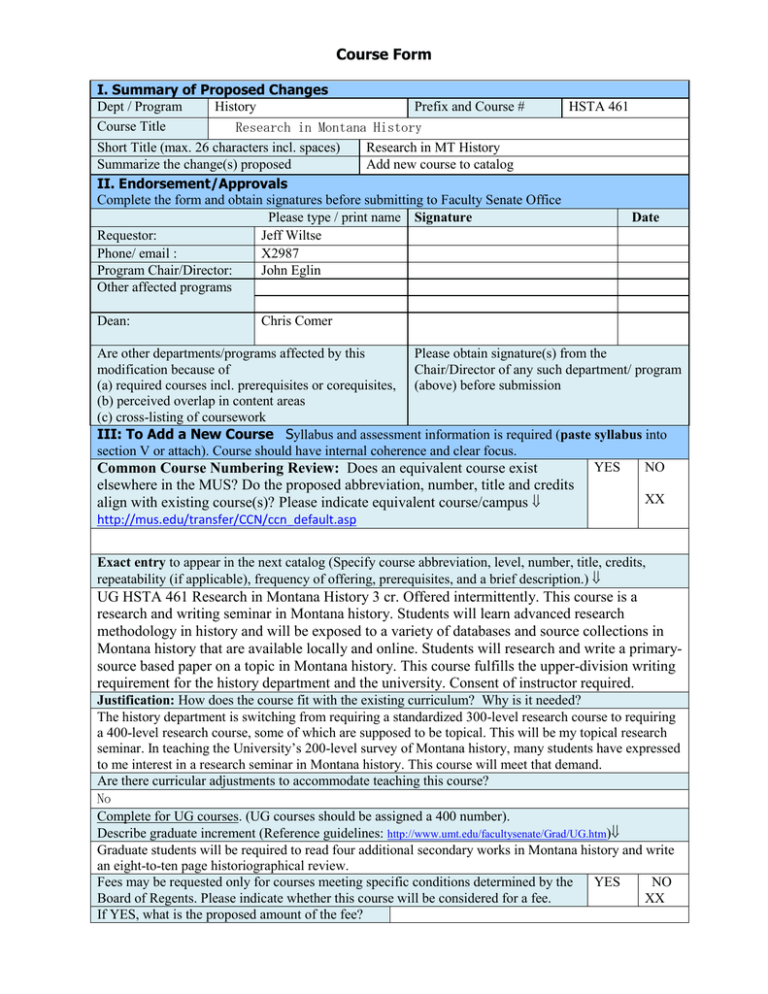
Course Form I. Summary of Proposed Changes Dept / Program History Prefix and Course # HSTA 461 Course Title Research in Montana History Short Title (max. 26 characters incl. spaces) Research in MT History Summarize the change(s) proposed Add new course to catalog II. Endorsement/Approvals Complete the form and obtain signatures before submitting to Faculty Senate Office Please type / print name Signature Date Requestor: Jeff Wiltse Phone/ email : X2987 Program Chair/Director: John Eglin Other affected programs Dean: Chris Comer Are other departments/programs affected by this Please obtain signature(s) from the modification because of Chair/Director of any such department/ program (a) required courses incl. prerequisites or corequisites, (above) before submission (b) perceived overlap in content areas (c) cross-listing of coursework III: To Add a New Course Syllabus and assessment information is required (paste syllabus into section V or attach). Course should have internal coherence and clear focus. YES NO Common Course Numbering Review: Does an equivalent course exist elsewhere in the MUS? Do the proposed abbreviation, number, title and credits align with existing course(s)? Please indicate equivalent course/campus XX http://mus.edu/transfer/CCN/ccn_default.asp Exact entry to appear in the next catalog (Specify course abbreviation, level, number, title, credits, repeatability (if applicable), frequency of offering, prerequisites, and a brief description.) UG HSTA 461 Research in Montana History 3 cr. Offered intermittently. This course is a research and writing seminar in Montana history. Students will learn advanced research methodology in history and will be exposed to a variety of databases and source collections in Montana history that are available locally and online. Students will research and write a primarysource based paper on a topic in Montana history. This course fulfills the upper-division writing requirement for the history department and the university. Consent of instructor required. Justification: How does the course fit with the existing curriculum? Why is it needed? The history department is switching from requiring a standardized 300-level research course to requiring a 400-level research course, some of which are supposed to be topical. This will be my topical research seminar. In teaching the University’s 200-level survey of Montana history, many students have expressed to me interest in a research seminar in Montana history. This course will meet that demand. Are there curricular adjustments to accommodate teaching this course? No Complete for UG courses. (UG courses should be assigned a 400 number). Describe graduate increment (Reference guidelines: http://www.umt.edu/facultysenate/Grad/UG.htm) Graduate students will be required to read four additional secondary works in Montana history and write an eight-to-ten page historiographical review. Fees may be requested only for courses meeting specific conditions determined by the YES NO Board of Regents. Please indicate whether this course will be considered for a fee. XX If YES, what is the proposed amount of the fee? Justification: IV. To Delete or Change an Existing Course – check X all that apply Deletion Title Course Number Change From: Level U, UG, G To: Description Change Change in Credits From: To: Repeatability Cross Listing (primary program initiates form) Prerequisites Is there a fee associated with the course? 1. Current course information at it appears in catalog 2. Full and exact entry (as proposed) (http://www.umt.edu/catalog) From: To: 3. If cross-listed course: secondary program & course number 4. Is this a course with MUS Common Course Numbering? If yes, then will this change eliminate the course’s common course status? Please explain below. 5. Graduate increment if level of course is changed to UG. Reference guidelines at: http://www.umt.edu/facultysenate/Grad/UG.htm (syllabus required in section V) Have you reviewed the graduate increment guidelines? Please check (X) space provided. 6. Other programs affected by the change 7. Justification for proposed change V. Syllabus/Assessment Information Required for new courses and course change from U to UG. Paste syllabus in field below or attach and send digital copy with form. Professor Jeff Wiltse jeffrey.wiltse@umontana.edu LA 263/x2987 Office hours: HSTA 461: Research in Montana History Description This course is a research and writing seminar in Montana history. Students will learn advanced research methodology in history and will be exposed to the variety of databases and source collections in Montana history that are available locally and online. Students will research and write a thirty-page, primary-source scholarly paper on a topic in Montana history. This course fulfills the upper-division writing requirement for the history department and the university. Course Objectives Expand students’ knowledge in Montana history. Teach students how to frame a research problem and develop a research question. Teach students how to identify relevant primary and secondary sources. Teach students to research in key online databases, including World Cat, America: History & Life, American Periodical Series, Congressional Record, Northwest Digital Archive, and New York Times Historical. 5. Improve student’s ability to analyze historical sources. 1. 2. 3. 4. 6. Improve students’ ability to organize and write a sophisticated, argument-driven research paper. Readings Copies of the following books are available at the bookstore. They are the primary texts for the course. Wayne Booth, et al., The Craft of Research Anthony Brundage, Going to the Sources: A Guide to Historical Research and Writing Michael Malone, et al., Montana: A History of Two Centuries Assignments Prospectus: A proposal that describes your research project, states your initial research question, and identifies relevant primary and secondary sources. Source Analysis: A preliminary four-page paper that analyzes some of the primary sources you have collected for the research project. Draft: A complete draft of your thirty-page research paper. Research Paper: The final, revised version of your thirty-page research paper. Grading Your final grade will be the weighted average of your individual grades for the term. Final letter grades are figured at 90%=A, 80%=B, 70%=C, 60%=D. The dividing line for pluses is _7% and minuses _3%. You must take this course for a grade. Grades will be weighted as follows: Prospectus Source Analysis Draft Research Paper Participation 10 percent 15 percent 25 percent 40 percent 10 percent Academic Honesty Neither plagiarism nor any form of cheating will be tolerated. The work you submit in this course must be your own. When you draw from the words and thoughts of others, acknowledge it in footnotes. Plagiarism/cheating will result in a failing grade for the course. Course Schedule Week One: Course Introduction Week Two: Historical Research and Writing Read: Brundage, Going to the Sources, 1-61. Week Three: Sources in Montana History I (Meet in Library) Read: Malone, Montana, 3-186. Week Four: Sources in Montana History II (Meet in Library) Read: Malone, Montana, 187-385. Week Five: Research Problems and Questions Read: Booth, Craft of Research, 29-102. Brundage, Going to the Sources, 95-117. Week Six: Prospectus Workshop Read: Article on writing a prospectus Week Seven: Document Analysis Workshop Prospectus Due Read: Document Set Booth, Craft of Research, 103-170. Week Eight: Individual Meetings with Professor (Discuss Prospectus) Week Nine: Models of Scholarly History Articles Document Analysis Due Read: Kent Curtis, “Producing a Gold Rush: National Ambitions and the Northern Rocky Mountains,” WHQ (Autumn 2009), 275-298. Eric Clements, “Pragmatic Revolutionaries?: Tactics, Ideologies, and the Western Federation of Miners in the Progressive Era,” WHQ (Winter 2009), 445-468. Week Ten: Individual Meetings with Professor (Discuss Document Analysis Papers) Week Eleven: Drafting Workshop Read: Booth, Craft of Research, 171-248. Week Twelve: Revising and Rewriting Draft Due Read: Booth, Craft of Research, 249-270. Brundage, Going to the Sources, 118-34. Week Thirteen: Individual Meetings with Professor (Discuss Drafts) Week Fourteen: Research Presentations Week Fifteen: Research Presentations Research Paper Due VI Department Summary (Required if several forms are submitted) In a separate document list course number, title, and proposed change for all proposals. VII Copies and Electronic Submission. After approval, submit original, one copy, summary of proposals and electronic file to the Faculty Senate Office, UH 221, camie.foos@mso.umt.edu. Revised 11-2009
